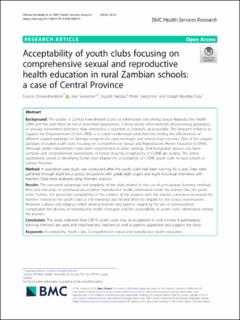| dc.contributor.author | Chirwa-Kambole, Eunice | |
| dc.contributor.author | Svanemyr, Joar | |
| dc.contributor.author | Sandøy, Ingvild Fossgard | |
| dc.contributor.author | Hangoma, Peter | |
| dc.contributor.author | Zulu, Joseph Mumba | |
| dc.date.accessioned | 2021-05-31T10:51:26Z | |
| dc.date.available | 2021-05-31T10:51:26Z | |
| dc.date.created | 2020-05-18T16:33:00Z | |
| dc.date.issued | 2020 | |
| dc.Published | BMC Health Services Research. 2020, 20 (1), . | |
| dc.identifier.issn | 1472-6963 | |
| dc.identifier.uri | https://hdl.handle.net/11250/2757040 | |
| dc.description.abstract | Background
The youths in Zambia have limited access to information concerning Sexual Reproductive Health (SRH) and this puts them at risk of unwanted pregnancies. Talking about other methods of preventing pregnancy or sexually transmitted infections than abstinence is regarded as culturally unacceptable. The Research Initiative to Support the Empowerment of Girls (RISE) is a cluster randomised controlled trial testing the effectiveness of different support packages on teenage pregnancies, early marriages and school drop-out rates. One of the support packages included youth clubs focusing on Comprehensive Sexual and Reproductive Health Education (CSRHE).
Although similar interventions have been implemented in other settings, their integration process has been complex and comprehensive assessments of factors shaping acceptability of CSRHE are lacking. This article qualitatively aimed at identifying factors that shaped the acceptability of CSRHE youth clubs in rural schools in Central Province.
Method
A qualitative case study was conducted after the youth clubs had been running for a year. Data were gathered through eight focus group discussions with grade eight pupils and eight individual interviews with teachers. Data were analysed using thematic analysis.
Results
The perceived advantage and simplicity of the clubs related to the use of participatory learning methods, films and role plays to communicate sensitive reproductive health information made the learners like the youth clubs. Further, the perceived compatibility of the content of the sessions with the science curriculum increased the learners’ interest in the youth clubs as the meetings also helped them to prepare for the school examinations. However, cultural and religious beliefs among teachers and parents regarding the use of contraceptives complicated the delivery of reproductive health messages and the acceptability of youth clubs’ information among the learners.
Conclusion
The study indicated that CSRHE youth clubs may be acceptable in rural schools if participatory learning methods are used and head-teachers, teachers as well as parents appreciate and support the clubs. | en_US |
| dc.language.iso | eng | en_US |
| dc.publisher | BMC | en_US |
| dc.rights | Navngivelse 4.0 Internasjonal | * |
| dc.rights.uri | http://creativecommons.org/licenses/by/4.0/deed.no | * |
| dc.title | Acceptability of youth clubs focusing on comprehensive sexual and reproductive health education in rural Zambian schools: a case of Central Province | en_US |
| dc.type | Journal article | en_US |
| dc.type | Peer reviewed | en_US |
| dc.description.version | publishedVersion | en_US |
| dc.rights.holder | Copyright The Author(s). 2020 | en_US |
| dc.source.articlenumber | 42 | en_US |
| cristin.ispublished | true | |
| cristin.fulltext | original | |
| cristin.qualitycode | 2 | |
| dc.identifier.doi | 10.1186/s12913-020-4889-0 | |
| dc.identifier.cristin | 1811563 | |
| dc.source.journal | BMC Health Services Research | en_US |
| dc.source.40 | 20 | |
| dc.source.14 | 1 | |
| dc.relation.project | Norges forskningsråd: 248121 | en_US |
| dc.relation.project | Norges forskningsråd: 223269 | en_US |
| dc.identifier.citation | BMC Health Services Research. 2020, 20, 42. | en_US |
| dc.source.volume | 20 | en_US |

